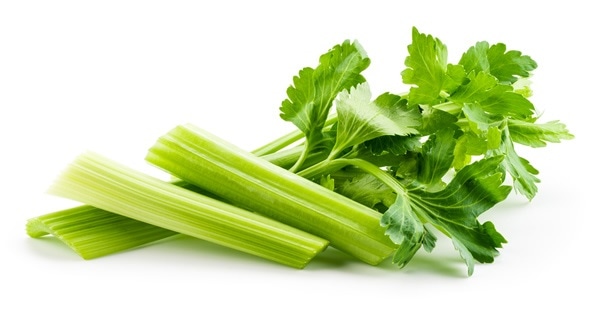Celery Allergy

A food allergy is a result of your immune system getting confused by the structural similarity between proteins found in pollen or the harmless proteins found in certain foods.

Perceiving the latter as a threat, it releases immunoglobulin E (IgE), which activates an allergic reaction. This involves the release of chemicals such as histamine, which is responsible for skin reddening and swelling, itching, and rhinitis.
This reaction may be localized, producing a limited allergy, such as in your skin, mouth, or throat. It can also be a generalized reaction that releasing enormous amounts of histamine and many other chemicals into the blood, which causes systemic collapse and a wide variety of other symptoms.
In pollen-sensitized individuals, celery root is a common cause of food allergy. Celery is a part of the Umbelliferae family, which includes carrot, coriander, dill, and parsley. Also called Apiumgraveolans, it is grown all over the world.
Symptoms of Celery Allergy
Celery can cause photosensitivity in allergic individuals, resulting in blistered skin after just a little sun exposure. This reaction is seen chiefly in pickers, canners, and those who work in food stores.
When celery is affected by pink rot, the fungus tends to increase the photosensitizing capacity of the plant. Some people have even developed severe sunburn after ingesting celery in the form of soup.
In sensitive people, celery also causes allergic rashes, leading to allergic contact dermatitis, urticaria, angioedema, asthma, and anaphylaxis.
While celery stem is the most common culprit, celery oil and celery root have also been reported to cause anaphylactic reactions.
Allergic reactions to other vegetables, as well as to mugwort and birch pollen, were also observed to co-exist. The allergens are formed in the tuber root, and are only partially destroyed by heating.
Raw celery consumption has been found to be associated with a higher prevalence of allergy to the vegetable. It is also related to pollen allergy. Symptoms may range from mild mouth allergies to systemic reactions.
Since celery antigens resist heat and processing, individuals with such sensitivity must avoid all forms of celery, as in soups, broths, or salad dressings containing celery. Thus it is important to label all celery-containing products for the benefit of people with celery allergy.
Diagnosis and Treatment
The diagnosis of celery allergy is based on allergic symptoms following celery consumption. It can be confirmed by skin prick tests (SPTs) using crude celery, celery extracts, and various pollen extracts. The specific IgE for celery sensitivity is determined by the CAP method.
Treatment involves avoiding celery intake in any form, and intake of antihistamines, topical steroids, eye drops or asthma medications, depending on the specific symptoms and signs.
Oral corticosteroids may be required for a short time to reverse allergic reactions. Desensitization is another option that can be employed depending on the type of allergy and the severity of reaction.
Epinephrine self-administration is the first-line treatment for individuals with a history of anaphylaxis as a result of a tested food allergy. Such patients require immediate hospitalization even after the use of epinephrine.
References
- http://www.ncbi.nlm.nih.gov/pubmed/10932083
- Fleming D. Dermatitis in grocery workers associated with high natural concentrations of furanocoumarins in celery. Allergy Proc. 1990 May-Jun;11(3):125-7.
- Seligman PJ, Mathias CG, O'Malley MA, Beier RC, Fehrs LJ, Serrill WS, Halperin WE. Phytophotodermatitis from celery among grocery store workers. Arch Dermatol. 1987 Nov;123(11):1478-82.
- http://www.nhs.uk/Conditions/food-allergy/Pages/Causes.aspx
- http://www.ncbi.nlm.nih.gov/pubmed/3258136
- http://www.ncbi.nlm.nih.gov/pubmed/2288391
Further Reading
- All Allergy Content
- What are Allergies?
- Different Types of Allergies
- Old Friends Hypothesis
- What is the Microbial Diversity Hypothesis?
Last Updated: Feb 26, 2019

Written by
Dr. Liji Thomas
Dr. Liji Thomas is an OB-GYN, who graduated from the Government Medical College, University of Calicut, Kerala, in 2001. Liji practiced as a full-time consultant in obstetrics/gynecology in a private hospital for a few years following her graduation. She has counseled hundreds of patients facing issues from pregnancy-related problems and infertility, and has been in charge of over 2,000 deliveries, striving always to achieve a normal delivery rather than operative.
Source: Read Full Article